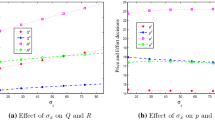Abstract
In this paper, we study the coordination problem for a supply chain composed of one supplier and one retailer when the demand is a fuzzy variable that is dependent on sales effort. We find that neither a buyback contract nor a promotion cost-sharing contract can coordinate the supply chain in this setting. Furthermore, we design a composite contract by combining a buyback contract with a promotion cost-sharing contract to coordinate the supply chain and analyze the coordination conditions. We also draw a performance comparison of the designed composite contract and the price-only contract for the profit maximization of the supply chain and present some extensions. Finally, the main theoretical results and the effectiveness of the designed composite contract are illustrated with numerical examples. We show that the production cost and sensitivity parameter of effort cost have negative impacts on the expected profits of the supplier, the retailer and the entire supply chain, whereas basic demand and the sensitivity parameter of demand stimulation have positive impacts on their profits.




Similar content being viewed by others
References
Aamir R, Ashfaq R, Wang XZ, Huang JZ et al (2017) Fuzziness based semi-supervised learning approach for intrusion detection system. Inf Sci 378:484–497
Abdul-Jalbar B, Colebrook M, Dorta-Guerra R, Gutierrez JM (2016) Centralized and decentralized inventory policies for a single-vendor two-buyer system with permissible delay in payments. Comput Oper Res 74:187–195
Aljazzar SM, Jaber MY, Moussawi-Haidar L (2017) Coordination of a three-level supply chain (supplier–manufacturer–retailer) with permissible delay in payments and price discounts. Appl Math Model 48:289–302
Aljazzar SM, Jaber MY, Moussawi-Haidar L (2016) Coordination of a three-level supply chain (supplier–manufacturer–retailer) with permissible delay in payments. Appl Math Model 40(21):9594–9614
Bai QG, Xu XH, Xu JT, Wang D (2016) Coordinating a supply chain for deteriorating items with multi-factor-dependent demand over a finite planning horizon. Appl Math Model 40(21):9342–9361
Basiri Z, Heydari J (2017) A mathematical model for green supply chain coordination with substitutable products. J Clean Prod 145:232–249
Blattberg RC, Neslin SA (1990) Sales promotion: concepts, methods, and strategies. Prentice Hall, Englewood Cliffs
Cachon GP (2003) Supply chain coordination with contracts. Handb Oper Res Manag Sci 11:227–339
Cachon GP, Lariviere MA (2005) Supply chain coordination with revenue-sharing contracts: strengths and limitations. Manag Sci 51(1):30–44
Chang S, Yeh T (2013) A two-echelon supply chain of a returnable product with fuzzy demand. Appl Math Model 37(6):4305–4315
Chiu CH, Choi TM, Li X (2015) Supply chain coordination with risk sensitive retailer under target sales rebate. Automatica 47(8):1617–1625
Donohue K (2000) Efficient supply contracts for fashion goods with forecast updating and two production modes. Manag Sci 46(11):1397–1411
Ehring D (2006) The Walmart model. Mortg Bank 67:114–117
Emmons H, Gilbert S (1998) Return policies in pricing and inventory decisions for catalogue goods. Manag Sci 44(2):276–283
Eppen G, Iyer A (1997) Backup agreements in fashion buying—the value of upstream flexibility. Manag Sci 43(11):1469–1484
Gurnani H, Erkoc M, Luo Y (2007) Impact of product pricing and timing of investment decisions on supply chain coopetition. Eur J Oper Res 180(1):228–248
Hacket SC (1993) Consignment contracting. J Econ Behav Org 20:247–253
He Y, Zhao X, Zhao LD, He J (2009) Coordinating a supply chain with effort and price dependent stochastic demand. Appl Math Model 33(6):2777–2790
Heydari J (2013) Coordinating replenishment decisions in a two-stage supply chain by considering truckload limitation based on delay in payments. Int J Syst Sci 46(10):1–12
Heydari J (2014) Supply chain coordination using time-based temporary price discounts. Comput Ind Eng 75:96–101
Heydari J, Norouzinasab Y (2015) A two-level discount model for coordinating a decentralized supply chain considering stochastic price-sensitive demand. J Ind Eng Int 11(4):531–542
Heydari J, Najafi JA (2016) Coordinating inventory decisions in a two-echelon supply chain through the target sales rebate contract. Int J Invent Res 3(1):49–69
Hu BY, Feng Y (2017) Optimization and coordination of supply chain with revenue sharing contracts and service requirement under supply and demand uncertainty. Int J Prod Econ 183:185–193
Hu BY, Meng C, Xu D, Son YJ (2016) Three-echelon supply chain coordination with a loss-averse retailer and revenue sharing contracts. Int J Prod Econ 179:192–202
Jørgensen S, Sigue SP, Zaccour G (2000) Dynamic cooperative advertising in a channel. J Retail 76(1):71–92
Kaya O (2011) Outsourcing vs. in-house production: a comparison of supply chain contracts. Omega 39:168–178
Krishnan H, Kapuscinski R, Butz DA (2004) Coordinating contracts for decentralized supply chains with manufacturer promotional effort. Manag Sci 50(1):48–63
Lan YF, Zhao RQ, Tang WS (2014) A fuzzy supply chain contract problem with pricing and warranty. J Intell Fuzzy Syst 26(3):1527–1538
Lau H, Su C, Wang Y, Hua Z (2012) Volume discounting coordinates a supply chain effectively when demand is sensitive to both price and sales effort. Comput Oper Res 39(12):3267–3280
Lee C, Rhee B (2011) Trade credit for supply chain coordination. Eur J Oper Res 214(1):136–146
Liu B (2004) Uncertainty theory: an introduction to its axiomatic foundations. Springer, Berlin
Ma P, Wang HY, Shang J (2013) Contract design for two-stage supply chain coordination: integrating manufacturer-quality and retailer-marketing efforts. Int J Prod Econ 146:745–755
Ma P, Wang HY, Shang J (2013) Supply chain channel strategies with quality and marketing effort-dependent demand. Int J Prod Econ 144:572–581
Padmanabhan V, Png IPL (1997) Manufactrrer’s return policy and retail competition. Mark Sci 16(1):81–94
Pasternack B (1985) Optimal pricing and returns policies for perishable commodities. Mark Sci 4(2):166–176
Petrovic B, Roy R, Petrovic R (1999) Supply chain modelling using fuzzy sets. Int J Prod Econ 53:443–453
Ryu K, Yücesan E (2010) A fuzzy newsvendor approach to supply chain coordination. Eur J Oper Res 200(2):421–438
Shen Y, Willems SP (2012) Coordinating a channel with asymmetric cost information and the manufacturer’s optimality. Int J Prod Econ 135(1):125–135
Song Y, Ray S, Li S (2008) Structural properties of buyback contracts for price-setting newsvendors. Manuf Serv Oper Manag 10(1):1–18
Stalk G, Evans P, Shulman LE (1992) Competing on capabilities: the new rules of corporate strategy. Harv Bus Rev 70(2):57–69
Taylor TA (2002) Supply chain coordination under channel rebates with sales efforts. Manag Sci 48(8):992–1007
Tsao Y, Sheen G (2012) Effects of promotion cost sharing policy with the sales learning curve on supply chain coordination. Comput Oper Res 39(8):1872–1878
Tsay AA, Agrawal N (2000) Channel dynamics under price and service competition. Manuf Serv Oper Manag 2(4):372–391
Wang H, Wang W, Kobaccy K (2007) Analysis and design of returns policies from a supplier’s perspective. J Oper Res Soc 58:391–401
Wang JY, Zhao RQ, Tang WS (2008) Supply chain coordination by revenue-sharing contract with fuzzy demand. J Intell Fuzzy Syst 19(6):409–420
Wang JY, Zhao RQ, Tang WS (2009) Supply chain coordination by single-period and long-term contracts with fuzzy market demand. Tsinghua Sci Technol 14(2):218–224
Wang R, Kwon S, Wang XZ, Jiang QS (2015) Segment based decision tree induction with continuous valued attributes. IEEE Trans Cybern 45(7):1262–1275
Wang XB, Wang XH (2009) Supply chain coordination based on buy back contract with fuzzy demand. In: Proceedings of the 8th IEEE international conference on machine learning and cybernetics. IEEE, pp 839–843
Wang XZ, Aamir R, Fu AM (2015) Fuzziness based sample categorization for classifier performance improvement. J Intell Fuzzy Syst 29(3):1185–1196
Wang XZ, Xing HJ, Li Y et al (2015) A study on relationship between generalization abilities and fuzziness of base classifiers in ensemble learning. IEEE Trans Fuzzy Syst 23(5):1638–1654
Wei J, Sun L, Xia J (2009) Supply chain coordination with fuzzy demand. In: Proceedings of ICAL ’09, IEEE international conference on automation and logistics. IEEE, pp 1786–1790
Wei Y, Chen Y (2011) Joint determination of inventory replenishment and sales effort with uncertain market responses. Int J Prod Econ 134:368–374
Weng Z (1995) Channel coordination and quantity discounts. Manag Sci 41(9):1509–1522
Wu DD (2013) Bargaining in supply chain with price and promotional effort dependent demand. Math Comput Model 58(9–10):1659–1669
Xing D, Liu T (2012) Sales effort free riding and coordination with price match and channel rebate. Eur J Oper Res 219(2):264–271
Xu R, Zhai X (2010) Analysis of supply chain coordination under fuzzy demand in a two-stage supply chain. Appl Math Model 34(1):129–139
Xu R, Zhai X (2010) Manufacturer’s coordination mechanism for single-period supply chain problems with fuzzy demand. Math Comput Model 51(5–6):693–699
Yu AM, Liu LW (2012) Competing and coordination strategies for the dual-channel under stochastic demand and cooperative promotion. J Ind Eng Eng Manag 26(1):151–154
Zhang Q, Sang S (2010) Returns policy in supply chain with fuzzy demand. In: Proceedings of 7th IEEE international conference on service systems and service management (ICSSSM). IEEE, pp 1–5
Zhao J, Wei J (2014) The coordinating contracts for a fuzzy supply chain with effort and price dependent demand. Appl Math Model 38:2476–2489
Zissis D, Ioannou G, Burnetas A (2015) Supply chain coordination under discrete information asymmetries and quantity discounts. Omega 53:21–29
Acknowledgements
This research was supported by the National Natural Science Foundation of China (Nos. 71471126, 61402260), Hubei Province Natural Science Foundation of Key Project (No. 2015CFA144) and the Special Funds of Taishan Scholars Project of Shandong Province.
Author information
Authors and Affiliations
Corresponding author
Rights and permissions
About this article
Cite this article
Wang, X., Liu, Z. & Chen, H. A composite contract for coordinating a supply chain with sales effort-dependent fuzzy demand. Int. J. Mach. Learn. & Cyber. 10, 949–965 (2019). https://doi.org/10.1007/s13042-017-0774-5
Received:
Accepted:
Published:
Issue Date:
DOI: https://doi.org/10.1007/s13042-017-0774-5




